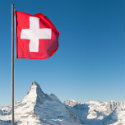
Switzerland's auction of new mobile frequencies to support 5G services has raised about 380 million Swiss francs (US$380 million) for state coffers, easily beating the minimum expectation of CHF220 million, despite concern that local laws on radiation limits could hold up 5G deployment.
Incumbent operator Swisscom AG (NYSE: SCM) along with rivals Sunrise Communications AG and Salt SA bagged frequencies in the 700MHz, 3.5GHz (the mid-band) and 1400MHz spectrum bands as they gear up for the rollout of the next-generation technology, which promises faster connections than today's 4G networks.
The outcome leaves each of the three operators with a decent share of the available spectrum in the 700MHz and 3.5GHz bands, unlike a 5G auction last year in Italy, where Telecom Italia and Vodafone collected 80% of the prized mid-band airwaves and Wind Tre and Iliad had to make do with the scraps. (See Italy's $7.6B 5G bonanza puts telcos on the rack.)
But Swisscom, which also picked up a much bigger chunk of 1400MHz spectrum than either of its rivals, coughed up most of the money in the Swiss auction, accounting for nearly CHF200 million of the total sum.
Although Switzerland's telecom regulator did not provide a breakdown of spending in each band, the overall proceeds work out at roughly CHF0.1 per MHz per Swiss inhabitant, less than a quarter of what Italian operators spent on mid-band airwaves. Light Reading approached Swiss authorities for details of spending on each license but had not heard back at the time of publication.
The takings were considerably higher than the government's overall base price even though some licenses went unsold. Competition from a fourth company called Dense Air, which ultimately dropped out of the process, may have driven up spectrum prices.
The licenses, which are valid for 15 years, will provide additional capacity for high-speed mobile data services and could in future help to support a new wave of applications outside the usual smartphone market. Examples may include connectivity for self-driving cars and remote-control robotic surgery.
Shortly after results were published, Swisscom announced plans to cover 60 Swiss towns and "communities" with 5G technology by the end of this year. The update comes a day after it forecast overall capital expenditure of CHF2.3 billion in 2019, excluding any spectrum fees, down from the CHF2.4 billion it spent last year.
"Swisscom initially plans to roll out 5G to 60 towns and communities by the end of 2019," said CEO Urs Schaeppi in a statement. "The first 5G-enabled devices are expected to reach the Swiss market in the next few months and will allow customers to enjoy higher speeds, faster response times and better capacity."
Want to know more about 5G? Check out our dedicated 5G content channel here on
Light Reading.
But there was no mention in today's statement of the concern about Swiss laws on radiation limits, which Swisscom this week flagged in its annual report as a potential showstopper for a comprehensive 5G deployment. (See Swisscom Capex to Dip as Radiation Laws Delay 5G Rollout.)
Switzerland's Ordinance on Non-Ionizing Radiation is said to be ten times stricter than European Union rules on radiation limits, and Swiss authorities have recently voted against relaxing those limits.
Public concern about the issue could impede network rollout, Swisscom has said. "Even without stricter legislation, public concerns about the effects of electromagnetic radiation on the environment and health could further hamper the construction of wireless networks in the future and drive up costs," it wrote in its annual report.
Rival Sunrise has also complained. CEO Olaf Swantee told a London conference in November he would initially focus on using 5G as a broadband-replacement technology in suburban and rural areas because of the radiation laws. (See Swiss Sunrise to Sunset Copper Broadband in Huawei-Led 5G Plan.)
After spending about CHF89 million on 5G frequencies, Swantee drew attention to the matter in today's statement on the auction results. "Now it's up to the Federal Council to amend mobile network radiation limits so the economy and entire population can really benefit from this positive starting point," he said.
In the meantime, Sunrise's focus on the broadband opportunity seems unlikely to change, with the operator pointing out that its new spectrum holdings would give suburban and rural areas "optical fiber speeds over the air."
In a parting shot at other European nations, Swantee also said that "providers in countries like Italy and the UK had to spend much more money for the most important frequencies."
Salt, which spent CHF94.5 million on spectrum, said it would aim to launch 5G services in the third quarter of the year using network equipment provided by Finnish equipment vendor Nokia Corp. (NYSE: NOK).
— Iain Morris, International Editor, Light Reading
Read more about:
EuropeAbout the Author(s)
You May Also Like




_International_Software_Products.jpeg?width=300&auto=webp&quality=80&disable=upscale)







